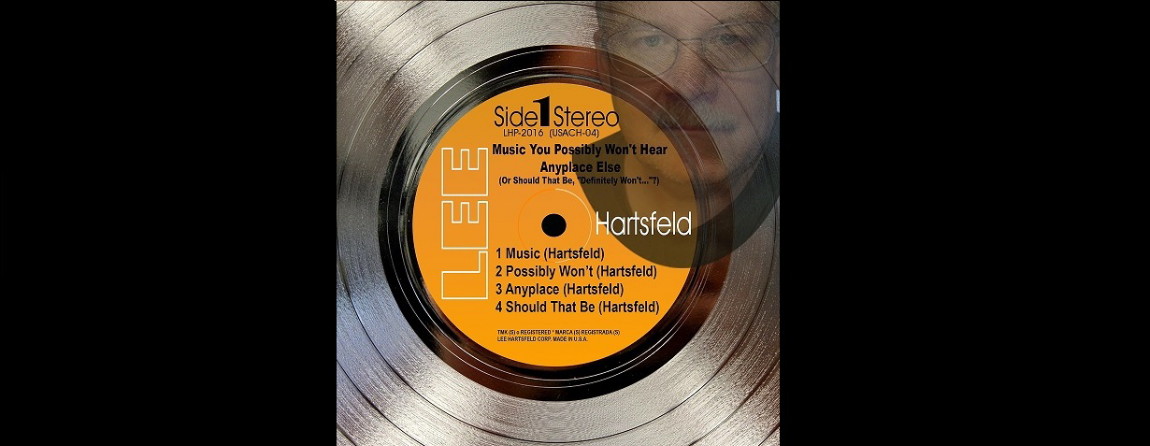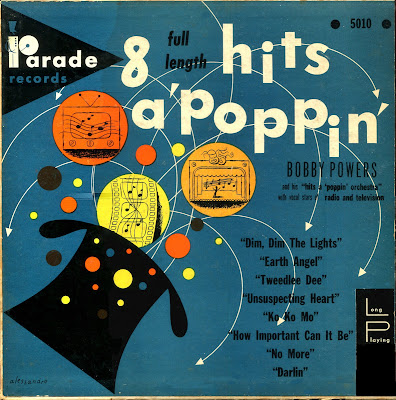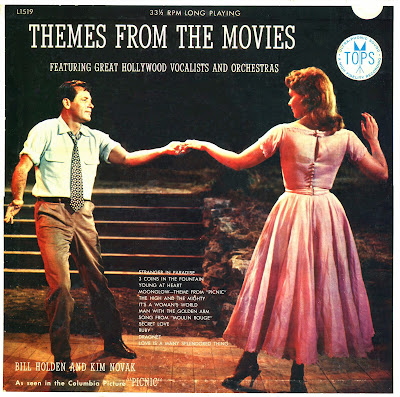Why would Parade stick the back cover of Gounod's Faust on a Hits A' Poppin' LP? Why would it rehyphenate the title as "Hits-A-Poppin" on the label? At what point did Synthetic Plastics Co. start making Parade Record Co. LPs? (There's an SPC credit on the back jacket.) Why does this version of Dim, Dim the Lights show also show up on the Music Masters and Gateway labels? How can we look up a word in the dictionary if we don't know how to spell it? Why can't central Ohio weather decide what season we're in??
The answers to these, and many more questions, at 11.
So, I had a "Déja Vu All Over Again" feeling about this LP--and, sure enough, I previously posted the six-selection 78 rpm version. Whose cover art is less cool. And we know that Yogi Berra never said "It's like déjà vu all over again," because the quip is meant for humor--it's deliberately redundant. And it was apparently in regular use during the 1960s, presumably minus the Berra attribution. So... But it seemed properly Berra-esque, and so the association continues.
Glad we cleared that up. So, here's my previous, 78-rpm-version post: Bobby Powers and His "Hits-a-Poppin" Orchestra. This time, we also get Dim, Dim the Lights and No More, both very well done.
All the titles came out as Prom singles, and I've given the original credits (and label info) for each. If my memory is working correctly, Enoch Light had just left Prom at this point, having started the Waldorf Record Corp., which included Waldorf Music Hall and 18 Top Hits. And somehow I'm only now noticing that Enoch was born in Canton OH.
As for the early rock and roll numbers in this list, Tweedle Dee, Earth Angel, and Ko Ko Mo are copies of cover versions--Georgia Gibbs (covering LaVern Baker), the Crew-Cuts (covering the Penguins), and The Crew-Cuts, again (covering Gene and Eunice). Perry Como also had a big hit with his cover of Ko Ko Mo, which sounds like a hilarious prospect but which actually came off fairly well. Dim, Dim the Lights, meanwhile, copies the Bill Haley and His Comets hit. It's a direct fake, so to speak.
And this is another fine thrift gift from Diane. (Thanks, Diane!)
DOWNLOAD: Eight Full Length Hits A' Poppin' (Parade Records 5010)
Dim, Dim the Lights--Tommy Scott and the Rockets (Prom 1103; 1955?)
Earth Angel--Rockets, The Prom Orchestra (Prom 1104; 1955)
Tweedle Dee--Wanda Storm and the Argyles (Prom 1106; 1955)
Unsuspecting Heart--Mona Grey, The Prom Orchestra (Prom 1105; 1955)
Ko Ko Mo--The Rockets, The Prom Orchestra (Prom 1104; 1955)
How Important Can It Be--Midge Manners, The Prom Orchestra (Prom 1105; 1955)
No More--The Mullen Sisters, The Prom Orchestra (Prom 1103; 1955?)
Darlin--The Argyles, The Prom Orchestra (Prom 1106; 1955)
Lee











